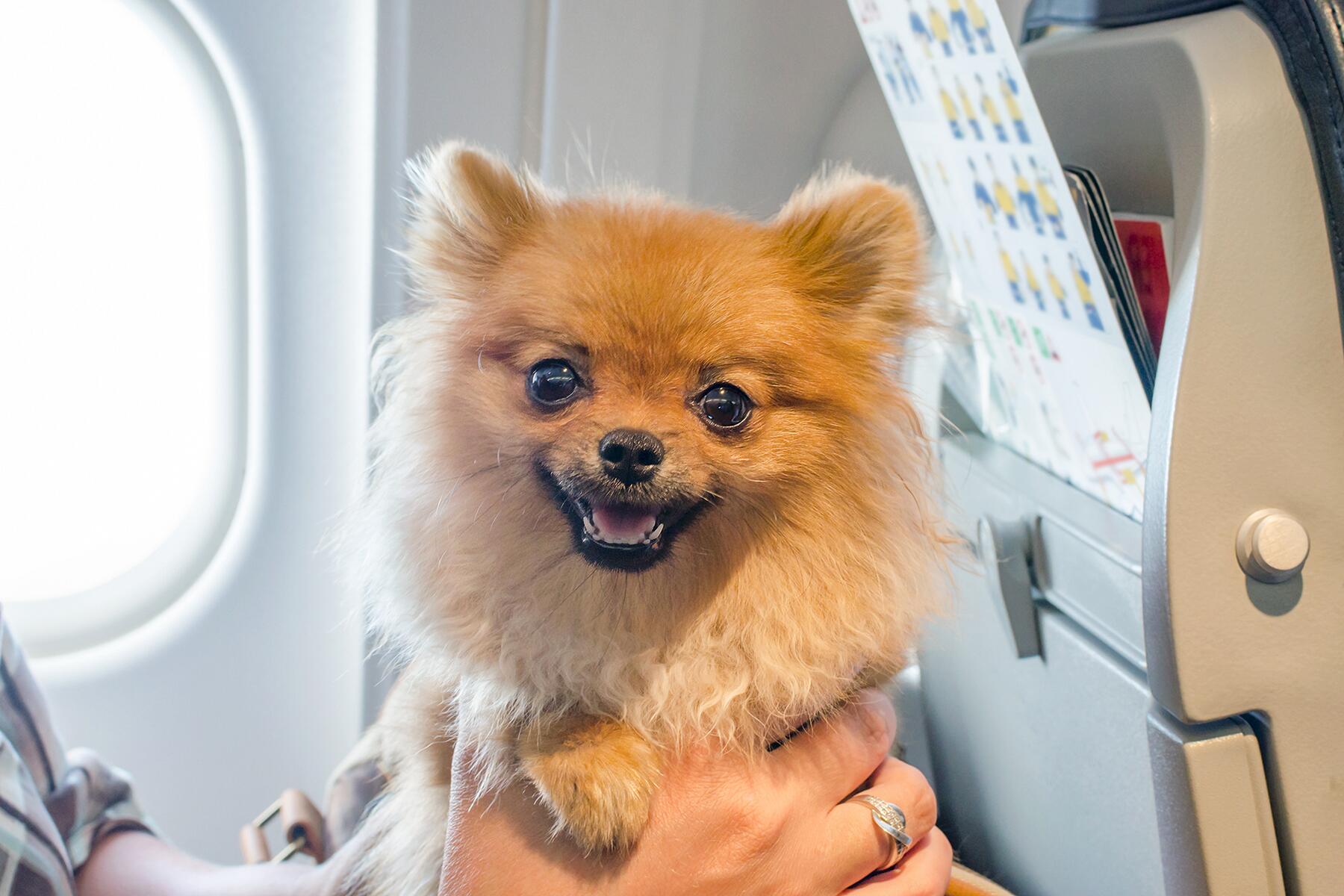Airlines will now treat emotional support animals as pets.
For years, passengers have flown a host of pets as emotional support animals, including dogs, cats, pigs, and mini horses. With ambiguity around what an emotional support animal is (they were classified as service animals that were allowed on planes without any fee), airlines accommodated requests from fliers who asked their pet be flown with them to help ease anxiety and offer comfort, with a note from a mental health professional. Many have unsuccessfully tried to take their snakes, spiders, peacocks, and rodents with them.
Unlike service dogs, emotional support animals didn’t need to be trained, so airlines often dealt with urination and defecation onboard, while passengers were made uncomfortable by pets–there have been reported incidents of aggravated allergies and attacks.
Finally, in 2018, Delta spelled out what animals passengers could take (no rodents, insects, or goats), and required owners to show their proof of health, vaccination certificate, a letter from a mental health professional, and a signed document declaring that the animal would behave during the flight. American Airlines and United cracked down on therapy pets, too, and banned people from taking a menagerie with them.

The debate has been long-going with passengers arguing that unruly animals disrupt flights, and fliers take advantage of the rule to fly their pets for free, which is a disservice to those with disabilities who truly need service animals. Airlines have also pointed out that untrained pets can compromise the safety of an aircraft, and the variety that’s seen on board is difficult for the crew to manage. On the other hand, nervous fliers or those with mental health issues find it comforting to travel with their pets.
Recommended Fodor’s Video
Airlines had the authority to refuse to admit aggressive animals that threatened the health and safety of others, but after more than 15,000 comments by airlines, individuals, people with disabilities, and airports, the U.S. Department of Transportation (DoT) has revised its regulation.
In December 2020, the DoT announced that emotional support animals will no longer be considered service animals. In this new ruling, a service animal was defined as “a dog that is individually trained to do work or perform tasks for the benefit of a person with a disability.” The agency also said that all the unusual animals that people have brought as emotional support pets have “eroded the public trust in legitimate service animals.”
On its heel came the news that airlines in the U.S. were changing their policies around emotional support animals—they would no longer be allowed in the cabin. Service dogs (including psychiatric service dogs), however, will continue to accompany passengers.
The DoT also makes it clear that passengers will have to fill out forms “attesting to a service animal’s health, behavior and training, and if taking a long flight, attesting that the service animal can either not relieve itself or can relieve itself in a sanitary manner.”
New Year, New Rules
Alaska Airlines was the first to declare the change in its policies following the DoT’s ruling. On December 29, the airline announced that “Effective January 11, 2021, Alaska will accept only service dogs which are trained to do work or perform tasks for the benefit of a qualified individual with a disability. Emotional support animals will no longer be accepted.”
Those currently booked for flights on and before February 28, 2021, will be able to take their emotional support animals with them. The airline also specified what passengers need to do to comfortably travel with their service dogs, including appropriate behavior (read here).
Just last week, American Airlines also joined Alaska as it aligned its policies with the DoT’s. Service dogs will be allowed on flight after authorization, while animals that previously traveled as emotional support animals may travel as cargo or carry-on pets. The new policies go into effect starting February 1.

Jessica Tyler, President of Cargo and Vice President of Airport Excellence for American said in the statement, “We’re confident this approach will enable us to better serve our customers, particularly those with disabilities who travel with service animals, and better protect our team members at the airport and on the aircraft.”
In a press release shared by Delta, Allison Ausband—S.V.P., In-Flight Service, applauded the DoT’s new ruling. The Atlanta-based airline has banned emotional support animals, reporting that since 2016, there has been an 85% increase in incidents of defecation, urination, and biting. Their change, effective January 11, also includes the lifting of its ban on pit bulls—a bone of contention between the airline and the DoT—because the new ruling says airlines can’t refuse to transport a service animal because of the breed. With Delta too, passengers will need to fill out a form and the staff can still refuse to board a service animal that shows aggressive behavior.
In December 2020, the DoT announced that emotional support animals will no longer be considered service animals. In this new ruling, a service animal was defined as “a dog that is individually trained to do work or perform tasks for the benefit of a person with a disability.”
United Airlines was also not far behind in sharing new service animal policies and informed that emotional support animals will be treated as pets. Service animals are allowed in the cabin and would need to be in control of their owners or handlers. Other guidelines include animal behavior, documentation, and seating. For those who have booked travels with an emotional support animal, United will honor bookings until February 28.
JetBlue has also confirmed that it won’t accept emotional support animals after February and passengers will have to bring them on board as pets.
So from next month, you will have to pay extra to bring their companions on board (Delta, American, JetBlue, and United charge $125 per carrier one way; Southwest charges $95). It is estimated that airlines will make $59.6 million a year in pet fees with this new rule and it has already started a Twitter war. Pet owners criticized these policies in the wake of airline bailouts by the federal government and defenders sided with airlines, reminding travelers that they can still bring their pets on board by paying a fee.
Travel is unpredictable these days, so before you book your next travels, make sure you read these new emotional support animal policies to avoid more surprises (or expenses).
Some pet owners are selfish, dishonest, and inconsiderate. They ruin it for people with a genuine need. Combine that with tiny seats, narrow aisles, and limited legroom....and you have miserable travelers (including the pets). Plus travelers are required to get to the airport hours before their departure time, so these animals are unable to relieve themselves for hours beyond the actual flight time. I have had the misfortune of sitting next to whiny, miserable "support" animals and it was not good for any of us.
How will this affect animals that are kept in airline-approved carriers that fit under the seat ahead of you? There is a fee for transporting such animals, and we took our cat onboard many times when transferring from post to post in the Foreign Service. There is a weight limit of 5 kgs and the fees are rather hefty. But we weren't comfortable entrusting our animals to cargo handlers and areas, where animals die at a frightening rate. We never claimed him to be a service animal or animal support animal.




This new ruling...which I totally agree with will also have a large group of "retailers" upset. There is a whole industry that has evolved on line, selleng documents, vests, crudentials, and other products that are purchased by people pretending to need "suport animals". These sellers will now have to move on to the next "scam"......